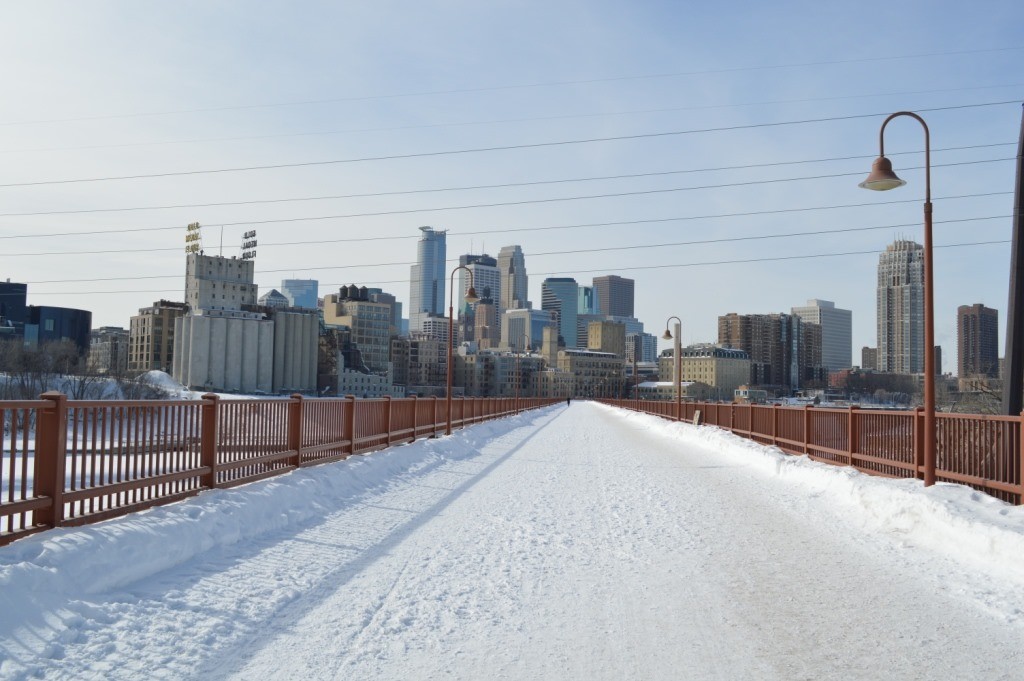
I do a lot of waiting. I remember this when my vision was better: standing in line at the grocery checkout or the drivers license office or even waiting for hours for a three-minute ride at Disneyland. I didn’t like that much.
I’ve learned with vision loss that waiting is part of the game. People tell me to stay where I am, they’re just running into the store for a second, or text me, that they are running 15 minutes late. At first, this really bothered me. I felt powerless, restless, and victimized. But with waiting, you have plenty of time to think. So I’ve turned waiting into something else.
I’m outside, waiting for an imminent ride. It’s 3 PM. I’m standing on a curb overlooking a parking lot piled high with blurry snowbanks. When it’s this cold, the sun should be out and the sky should be bottomless blue. Instead, it’s darkly overcast and an irregular breeze swirls the -10° air. I’ve noticed that when I stand outside and it’s hot, I might sweat, I might feel uncomfortable, but I don’t feel any particular sense of menace. Cold is different. Something deep in your brain doesn’t like it. If you really pay attention to the process of getting cold, you’ll see that you go from comfort, to discomfort, to an urge for immediate action. Cold creeps into you, like a hypodermic needle, and you experience it as a kind of pain. That’s when you think you should head back indoors. And in the old days, I would. But now, going back indoors means picking my way over an icy sidewalk and trying to find the door. So I wait, and examine the experience of slowly freezing.
I know intellectually that I’m in no danger, that my ride will arrive, or I will go inside. But I linger and follow the progress of the cold, and savor the vacuum of winter. I don’t hear any birds, just a rumble of distant traffic and the squeak of tires on subzero snow as cars enter or leave the parking lot. Winter is the absence of smell. Well, there is the scent of diesel, from a bus down the street or a trace of chemicals, probably from the salt on the asphalt. But overall, the smell of winter is a sharp nothing. If you leave real winter and go someplace with fake winter, like Tennessee, the first thing you notice when you step off the plane is smell. Not any particular smell – just the fact that there is something to smell. The winter air on a cold day is dryer than the air in the Sahara desert. Without any moisture, there’s no medium to carry the molecular stew to our olfactory nerves. Like me, they’re just waiting.
But I can’t freeze year-round, even in Minnesota. At more livable times of the year, I listen carefully to the sounds around me, 360°. Our brains filter so much of our sensory input. Because we favor our visual sense so strongly over our other senses, sometimes the other senses are all but lost. If, for example, you overrule the filter and listen to everything, it’s kind of an “eye-opening” experience. For one thing, it’s surround-sound. You’ll notice how well you can place sounds in terms of direction and distance, and that is actually pretty amazing. I’m struck that in an urban University environment, where I do most of my waiting, when I listen freely, I’ll hear unexpected things – a cricket, a bird song, a child’s laugh, a faraway boom. It’s kind of like watching a fire or a fish tank. I’m not sure you grow any wiser for doing it, but it does place you on the earth, with both feet, at the center of a maelstrom of exuberant existence.
Or, sometimes, when you wait, it gives you a chance to really get mad, to tease out some misfortune into indignation. You can mentally compose that e-mail that will show some person the absurdity of their position, or the thoughtlessness of their comment, or the breathtaking stupidity of their decision. You can compose it in your head and be done with it, and then you don’t actually have to write it, let alone send it. But getting amped up with outrage is not a good place to stay. And fortunately, waiting, which is always longer than you expect, gives you plenty of opportunity to unwind, to return to the Zen of powerlessness.
And then the car arrives, or people return from the store, and you reel in the straying thoughts, the wandering senses, and prepare yourself for interaction.
“Have you been waiting long?” they ask.
“No, not at all,” I say.
Copyright 2015 by Craig J. Hansen